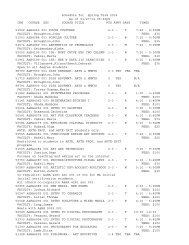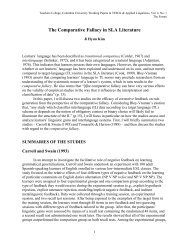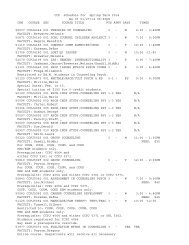UNICEF Mongolia - Teachers College Columbia University
UNICEF Mongolia - Teachers College Columbia University
UNICEF Mongolia - Teachers College Columbia University
You also want an ePaper? Increase the reach of your titles
YUMPU automatically turns print PDFs into web optimized ePapers that Google loves.
CHAPTER 4: THE IMPLEMENTATION OF THE 2007 SALARY REFORM AT SCHOOL LEVEL<br />
1<br />
2<br />
3<br />
4<br />
5<br />
6<br />
TEACHERS IN MONGOLIA: AN EMPIRICAL STUDY ON RECRUITMENT INTO TEACHING,<br />
PROFESSIONAL DEVELOPMENT, AND RETENTION OF TEACHERS<br />
Table 16: Summary Table of Key Findings and Recommendaons<br />
Objecve Key Findings (F) Recommendaons (R)<br />
1 Reducon of<br />
weekly teaching<br />
hours<br />
2 More<br />
Predictable and<br />
Transparent<br />
Income<br />
3 Reduce income<br />
inequalies<br />
between rural<br />
and urban<br />
schools<br />
F.1. 1. The statutory teaching load<br />
is 19 hours per week, but teachers<br />
work on average 20.4 hours, that is,<br />
they receive 1.4 hours of overme. 70<br />
percent of teachers teach at least 1<br />
addional hour per week.<br />
F.1.2. The lowest teaching load was<br />
15.7 hours and the highest 25.6 hours.<br />
Teaching excessive hours is a pracce<br />
of the past.<br />
F.1.3. The statutory teaching load<br />
is 646 hours per year in <strong>Mongolia</strong><br />
regardless of school level. It is much<br />
lower than the OECD average of 779<br />
hours (primary), 701 hours (lower<br />
secondary), and 656 hours (upper<br />
secondary).<br />
F.2.1. The salary structure has<br />
remained the same and is composed<br />
of the following six elements: base<br />
salary, addional hours, supplements<br />
for funcon, supplements for rank,<br />
bonuses for performance, and general<br />
benefits for public servants.<br />
F.2.2. There are fewer funconal<br />
supplements now than in the past.<br />
They are reduced to three: class<br />
teacher, cabinet organizer, and head<br />
of secon.<br />
F.2.3. The bonus system is fragmented<br />
and unequal between schools.<br />
F.3.1. <strong>Teachers</strong> in urban and semiurban<br />
do not teach more addional<br />
hours as compared to teachers in<br />
rural schools. The contrary applies in<br />
the sample of the schools that were<br />
examined: the schools with the largest<br />
actual teaching loads are soum-center<br />
schools based in Omnogobi (cause:<br />
teacher shortage.)<br />
F.3.2. <strong>Teachers</strong> in semi-urban and<br />
urban schools are likely to hold a<br />
higher rank (have more lead teachers<br />
and advisors), because the criteria<br />
for promoon fits beer teachers<br />
in those schools. For promoon to<br />
the rank of lead teachers, teachers<br />
need to have conducted research and<br />
workshops at aimag-centers or city<br />
level.<br />
R.1. Increase the statutory teaching load from 19<br />
to 20 hours per week and raise the base salary<br />
accordingly. This will reduce overme payments<br />
and also increases the annual statutory teaching<br />
load to 697 hours (34 weeks per year).<br />
R.1.2. No recommendaons – the objecve<br />
to prevent excessive teaching has been<br />
accomplished.<br />
R.1.3. The annual statutory teaching load should<br />
be increased to 697 hours per year in the short<br />
run (1 hour per week more; see first point above).<br />
In the medium-term, the instruconal me for<br />
students as well as the teaching load for teachers<br />
should be increased and the teaching load of<br />
teachers should be disnguished by school level.<br />
R.2.1. Many educaonal systems compensate<br />
internally, that is, teachers who teach fewer hours<br />
have to normally take on addional funcons,<br />
and vice versa (see point R.2.2.). In the long<br />
run, the fragmentaon of the salary could be<br />
reduced to four elements with addional hours<br />
& supplementary funcons being the excepon<br />
rather than the norm for most teachers.<br />
R.2.2. In the medium-term, teachers who funcon<br />
as class teachers, cabinet organizers, or heads<br />
of secon should be released from teaching<br />
by 1 or 2 hours per week rather than receiving<br />
supplementary payment.<br />
R.2.3. There is a need to completely revamp the<br />
bonus system – the next chapter explicitly deals<br />
with the bonus system.<br />
R.3.2. Income equality, arising from addional<br />
teaching hours, has been diminished.<br />
R.3.2. There is a need to revise the criteria for<br />
promoon from methodologist to lead teacher in<br />
order to ensure that teachers from rural schools<br />
are not at a disadvantage.<br />
74




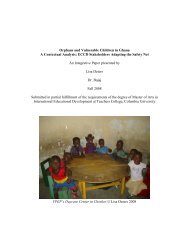
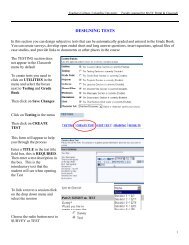
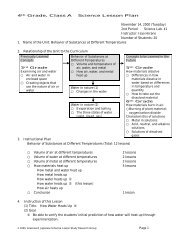
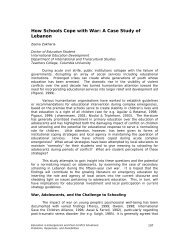





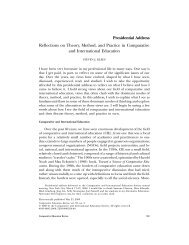
![TC Tod[...].pdf - Teachers College Columbia University](https://img.yumpu.com/27074883/1/190x252/tc-todpdf-teachers-college-columbia-university.jpg?quality=85)
